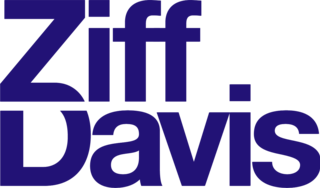Related Research Articles

In Internet activism, hacktivism, or hactivism, is the use of computer-based techniques such as hacking as a form of civil disobedience to promote a political agenda or social change. With roots in hacker culture and hacker ethics, its ends are often related to free speech, human rights, or freedom of information movements.

Ziff Davis, Inc. is an American digital media and internet company. First founded in 1927 by William Bernard Ziff Sr. and Bernard George Davis, the company primarily owns technology- and health-oriented media websites, online shopping-related services, internet connectivity services, gaming and entertainment brands, and cybersecurity and martech tools. Previously the company was predominantly a publisher of hobbyist magazines.

ZDNET is a business technology news website owned and operated by Red Ventures. The brand was founded on April 1, 1991, as a general interest technology portal from Ziff Davis and evolved into an enterprise IT-focused online publication.

PC Magazine is an American computer magazine published by Ziff Davis. A print edition was published from 1982 to January 2009. Publication of online editions started in late 1994 and have continued to the present day.

eWeek, formerly PCWeek, is a technology and business magazine. Previously owned by QuinStreet; Nashville, Tennessee marketing company TechnologyAdvice acquired eWeek in 2020.
Lifehacker is a weblog about life hacks and software that launched on January 31, 2005. The site was originally launched by Gawker Media and is currently owned by Ziff Davis. The blog posts cover a wide range of topics including: Microsoft Windows, Mac, Linux programs, iOS and Android, as well as general life tips and tricks. The website is known for its fast-paced release schedule from its inception, with content being published every half hour all day long.

Computer Shopper was a monthly consumer computer magazine published by SX2 Media Labs. The magazine ceased print publication in April 2009. The website was closed and redirected to the PCMag website in late May 2018.

James Louderback is the CEO of VidCon, and was previously the CEO of Revision3. He has had numerous jobs in media companies involved in technology, most notably with TechTV and editor-in-chief of PC Magazine. He is also well known as the television host of TechTV's Fresh Gear for three years from 1998 to 2000.

ExtremeTech is a technology weblog, launched in June 2001, which focuses on hardware, computer software, science and other technologies. Between 2003 and 2005, ExtremeTech was also a print magazine and the publisher of a popular series of how-to and do-it-yourself books.

Jeremy Hammond is an American activist and former computer hacker from Chicago. He founded the computer security training website HackThisSite in 2003. He was first imprisoned over the Protest Warrior hack in 2005 and was later convicted of computer fraud in 2013 for hacking the private intelligence firm Stratfor and releasing data to WikiLeaks, and sentenced to 10 years in prison.

Digital Trends is a Portland, Oregon-based tech news, lifestyle, and information website that publishes news, reviews, guides, how-to articles, descriptive videos and podcasts about technology and consumer electronics products. With offices in Portland, Oregon, New York City, Chicago and other locations, Digital Trends is operated by Digital Trends Media Group, a media company that also publishes Digital Trends Español, focusing on Spanish speakers worldwide, and a men's lifestyle site The Manual.

Anonymous is a decentralized international activist and hacktivist collective and movement primarily known for its various cyberattacks against several governments, government institutions and government agencies, corporations and the Church of Scientology.
The Jester is a self-identified grey hat hacktivist. He claims to be responsible for attacks on WikiLeaks and Islamist websites. He claims to be acting out of American patriotism.
Jake Leslie Davis, best known by his online pseudonym Topiary, is a British hacktivist. He has worked with Anonymous, LulzSec, and other similar groups. He was an associate of the Internet group Anonymous, which has publicly claimed various online attacks, including hacking HBGary, Westboro Baptist Church, and Gawker. They have also claimed responsibility for the defacing of government websites in countries such as Zimbabwe, Syria, Tunisia, Ireland, and Egypt.

LulzSec was a black hat computer hacking group that claimed responsibility for several high profile attacks, including the compromise of user accounts from PlayStation Network in 2011. The group also claimed responsibility for taking the CIA website offline. Some security professionals have commented that LulzSec has drawn attention to insecure systems and the dangers of password reuse. It has gained attention due to its high profile targets and the sarcastic messages it has posted in the aftermath of its attacks. One of the founders of LulzSec was computer security specialist Hector Monsegur, who used the online moniker Sabu. He later helped law enforcement track down other members of the organization as part of a plea deal. At least four associates of LulzSec were arrested in March 2012 as part of this investigation. Prior, British authorities had announced the arrests of two teenagers they alleged were LulzSec members, going by the pseudonyms T-flow and Topiary.

Operation Anti-Security, also referred to as Operation AntiSec or #AntiSec, is a series of hacking attacks performed by members of the hacking group LulzSec and Anonymous, and others inspired by the announcement of the operation. LulzSec performed the earliest attacks of the operation, with the first against the Serious Organised Crime Agency on 20 June 2011. Soon after, the group released information taken from the servers of the Arizona Department of Public Safety; Anonymous would later release information from the same agency two more times. An offshoot of the group calling themselves LulzSecBrazil launched attacks on numerous websites belonging to the Government of Brazil and the energy company Petrobras. LulzSec claimed to retire as a group, but on 18 July they reconvened to hack into the websites of British newspapers The Sun and The Times, posting a fake news story of the death of the publication's owner Rupert Murdoch.
Jana Winter is an American reporter best known for being first to report that James Holmes had sent a notebook to his University of Colorado psychiatrist Lynn Fenton with details about his premeditated plan to kill people before he allegedly did so. She joined The Intercept in 2014 and worked there through January 2016. Previously she had been a reporter from 2006 to 2008 for the New York Post, and from 2008 to 2014 for Fox News Channel.

Mustafa Al-Bassam is a British computer security researcher, hacker, and co-founder of Celestia Labs. Al-Bassam co-founded the hacker group LulzSec in 2011, which was responsible for several high profile breaches. He later went on to co-found Chainspace, a company implementing a smart contract platform, which was acquired by Facebook in 2019. In 2021, Al-Bassam graduated from University College London, completing a PhD in computer science with a thesis on Securely Scaling Blockchain Base Layers. In 2016, Forbes listed Al-Bassam as one of the 30 Under 30 entrepreneurs in technology.
Ryan Ackroyd, a.k.a.Kayla and lolspoon, is a former black hat hacker who was one of the six core members of the hacking group "LulzSec" during its 50-day spree of attacks from 6 May 2011 until 26 June 2011. At the time, Ackroyd posed as a female hacker named "Kayla" and was responsible for the penetration of multiple military and government domains and many high profile intrusions into the networks of Gawker in December 2010, HBGaryFederal in 2011, PBS, Sony, Infragard Atlanta, Fox Entertainment and others. He eventually served 30 months in prison for his hacking activities.

HMA is a VPN service founded in 2005 in the United Kingdom. It has been a subsidiary of the Czech cybersecurity company Avast since 2016.
References
- ↑ Kaplan, Jeremy. "Editor's Note: a New Chapter" . Retrieved 2017-07-24.
- ↑ "Ziff Davis to Launch ExtremeTech Magazine". Cision. 2004-07-24. Retrieved 2017-07-24.
- ↑ "Min's 2008 Best of the Web Winners". Min. 2008-04-14. Retrieved 2017-07-24.
- ↑ "GoodCleanTech Is a Neal Award Finalist!". PCMag. 2008-01-29. Retrieved 2017-07-24.
- ↑ Takahashi, Dean. "Ziff Davis to shut down ExtremeTech web site" . Retrieved 5 May 2011.
- ↑ Case, Loyd (June 22, 2009). "The Last Column". ExtremeTech.
- ↑ Winter, Jana (June 6, 2012). "EXCLUSIVE: Unmasking the world's most wanted hacker". FoxNews.com.
- ↑ Winter, Jana (June 6, 2012). "EXCLUSIVE: Inside LulzSec, a mastermind turns on his minions". FoxNews.com.
- ↑ Winter, Jana (June 6, 2012). "EXCLUSIVE: Infamous international hacking group LulzSec brought down by own leader". FoxNews.com.
- ↑ Kaplan, Jeremy. "Editor's Note: A New Chapter" . Retrieved 2017-07-24.
- ↑ Kaplan, Jeremy (September 18, 2017). "Exclusive: Beaten by Beats, here's how Monster is reinventing itself". Digital Trends. Retrieved November 26, 2017.
- 1 2 Kaplan, Jeremy (October 11, 2017). "Exclusive: Legal online gambling is returning to the U.S., if Monster plays its cards right". Digital Trends.
- ↑ Evangelista, Benny (October 13, 2017). "Monster Products rolls the dice on gambling technology". SF Chronicle.
- ↑ Twitter https://twitter.com/smashdawg/status/1396866251205586948 . Retrieved 2021-06-22.
{{cite web}}: Missing or empty|title=(help)